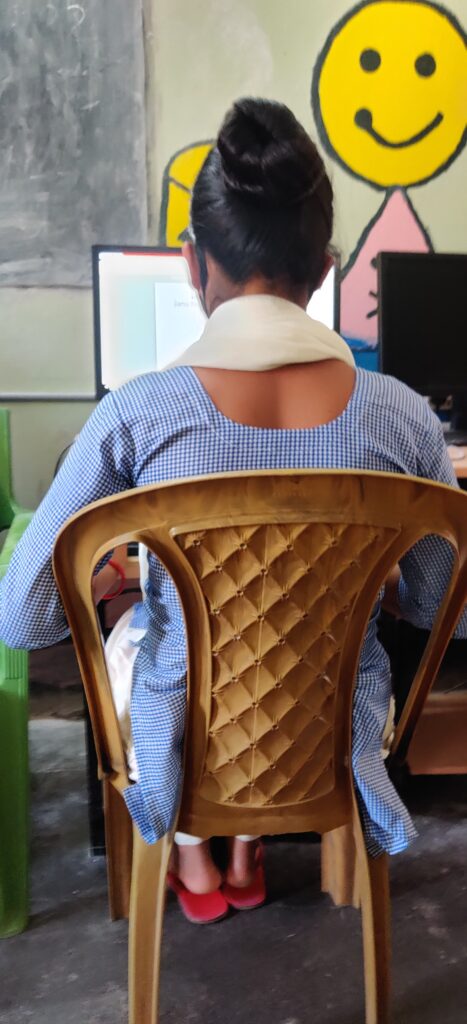Story
Sixteen year old finds support to stop her marriage and pursue her dreams
The STEM for Girls project, through its course materials and sessions, helps young girls to not only articulate their hopes and aspirations, but also empowers them with the skills, confidence and tools to help them on their journey to realize their dreams.
Details
Kamrup Rural: Sixteen year old Pooja (name changed), a class nine student of Kasturba Gandhi Balika Vidyalaya which is located in Chamaria (a village in Assam’s Kamrup district), has her eyes glued to the computer screen. She is furiously typing her notes and preparing for her upcoming examination.
The school is located in Kamrup rural district which is around 70 kilometers from Guwahati. The computer room is visually attractive as it is filled with many low cost scientific models ranging from a fan to a 3D heart model, all of which are made by the students themselves. Sadhana Kumari, who is a facilitator of the STEM for girls programme notices Pooja’s unwavering focus and says it is moments like these that leave her gratified. Pooja however interrupts her and says, “It is only because of Sadhana ma’am and the STEM For Girls (SFG) programme that I am in school today. If not for her, I would be married and would have discontinued my education.”
In December 2021 after Sadhana completed the gender module which is a part of the SFG programme, Pooja confided in her and told her she did not want to go home during the winter break as her parents had decided to get her married. Sadhana counseled Pooja to go home during her break, reason out with her parents and explain to them that she did not want to get married until she completes her education. “I had even told her the legal repercussions that her parents could face if they got her married before she turned 18. I had asked her to tell her parents that child marriage is a crime and if someone lodges a police complaint, they could be put behind bars for it,” Sadhana said.

While teaching one of the lessons ‘Thinking beyond gender stereotypes’, Sadhana was explaining to students how their gender identities influence their life experiences. She explained to her students that the legal age to get married for girls was 18 and boys was 21. She also spoke about the concept of child rights and issues of social injustice concerning children.
Equipped with the information that her mentor provided, Pooja, who has four sisters, went home during her winter vacations and spoke with her parents about her dreams and aspirations for the future. “I told my parents that I want to study and stand on my own feet. I told them that I want to accomplish something on my own and become independent.”
Her elder sister was married before she turned 18 and she has three younger sisters. Pooja said that her parents gave in and allowed her to continue her education as they knew that she was not going to take no for an answer.
Her father, who is a paddy farmer, said that he was pleasantly surprised to see how ambitious his daughter was. “I told her that we are getting proposals from men who are working in such good companies. But she said that she aspires to become a police officer and wants to stand on her own feet. I am not sure to what extent I will be able to support her financially, but I will certainly try,” he said. He also added that he was initially worried of what the “society” would think, but seeing his daughter’s grit and determination he decided to put it past him.
Sadhana, who has been working as a facilitator for the STEM for girls programme since 2019, says that she was thrilled to see Pooja back in class in January. “This motivated me to discuss the topic of child marriage in my class as many of my students come from lower socio-economic backgrounds. Many of my students listened with rapt attention and I hope that I have inspired many more like Pooja to chalk out their own dreams. I hope they find the courage to fight against many conventional norms and pursue their ambitions.”
Priya Bara, Programme Associate of Quest Alliance, Assam says that the STEM for Girls program, through its course materials and sessions, helps young girls to not only articulate their hopes and aspirations, but also empowers them with the skills, confidence and tools to help them on their journey to realizing their dreams.
Sadhana was glad that the program had created a space for these kinds of discussions which motivated facilitators like her to make real change on the ground.
Pooja has even narrated her experience in front of her entire class. Her teacher says from a shy girl, Pooja has transformed into a confident person who is determined to achieve her dreams. Pooja who hopes to become a police officer says, “My decision to not get married may be small and may not have changed how society perceives women. But I hope that my decision will inspire my three younger sisters to dream fearlessly and pursue their education.”
The STEM for girls programme is run across 1,000+ schools across seven states. It started in 2018, and through it we are impacting 200,000 girls and 100,000 boys across India.
Read more about the Secondary Schools Program here.